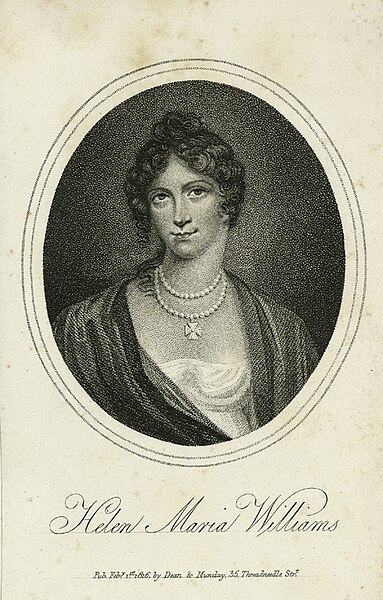
Helen Maria Williams
Sketches of the State and Opinions in the French Republic
Death of Madame Helvetius
「1801」Helen Maria Williams, “Death of Madame Helvetius,” letter 38 in vol. 2 of Sketches of the State of Manners and Opinions in the French Republic Towards the Close of the Eighteenth Century, in a Series of Letters「Google Books」(London, 1801) 210-25.
If there be any thing in the ordinary occurrences of life which calls loudly for the restraining hand of the legislator, it is the inhumanity in which the animal race is treated in this country.
Many evils, no doubt, yet remain to be corrected of which man is the sharer; but the attention of which in our present social institutions has been given to that disorder, and which will continue to be given till the mass of evil be diminished, ought not surely to supersede that which a common sense of justice, independantly of the feelings of pity, demand from man with respect to this portion of the animated system; a revolution whose favour is an event devoutly wished.
Had I any influence in the proposal or fabrication of laws, I should be tempted to leave the human race a while to its own good government, and form a code for the protection of animals. In this age of rights, can no one be found fantastically humane enough to make their wrongs a theme of public attention? In other countries laws are instituted for their protection; and fines, imprisonment, and event exile, are pronounced against wretches who in the rage of passion, or the wantonness of power, have forgotten the equality that exists between themselves and the objects of their cruelty. In England, an ill-treated horse, or over-driven bullock, has the law for its avenger. The rights of animals there form a part of the social compact.
At present it is the mode to descant on the superior progress we have made in civilization, beyond that which was obtained by the ancient Republic. In the theory of civilization we have, no doubt, made considerable advances, and we have greatly outstripped them in social organization. But let us not boast too loudly of our progress in practical humanity. Domestic slavery shrunk away before a religion, the essence of which is the doctrine of equality of rights; but previous to the introduction of Christianity, the codes of legislators were filled with regulations of mercy in favour of animals. The code of Triptolemus may be cited as an evidence of the estimation in which animals used for labour were held; and the agricultural , Roman writers would lead us to think that the laws were more favourable to beasts, than to men. We affect at present to look at Spartan manners with contempt; it were well if, in some cases, we studied Spartan humanity. The tribunal which condemned a boy to death for wantonly plucking out the eyes of a bird, pronounced a merciful judgment; animals were no longer mutilated, and infants’ sports became less atrocious.
Who can walk along the streets of Paris without having his sensibility strongly excited at the varying spectacles of brutal inhumanity which protrude themselves at almost every step, and which the police, in other countries, interferes to prevent? Who can frequent the roads near the capital without meeting processions of misery? an no law succour that wretched horse, worn to the bone from famine and fatigue, lashed by his cruel tyrant into exertion beyond his strength, while he drags, in some vile vehicle, six persons, besides his merciless master? For myself, I confess, that at the view of such spectacles, the charm of nature seems suddenly dissolved—to me the fields lose their verdue, and the woods their pleasantness—nor is my indignation confined to the unrelenting driver of these loaded machines; I consider the passengers who tacitly assent to the pain he inflicts, as more than his accomplices in barbarity. It is beneath the attention legislators to lessen the sufferings of those tender animals which we see heaped on each other in carts, their heads hanging down on each side of the machine, in every position of torture? If our social rights are of too dignified a nature to be shared with the brute creation, those rights ought at least to protect us from participating in their sufferings. The individual who strikes a single citizen is punished severely by the laws; the ruffian who harrows up the soul of every passenger by spectacles of torture, escapes unpunished. France may be a great, and civilized, and free nation, but till such evils are redressed, let it not boast of its humanity. (215-9)



